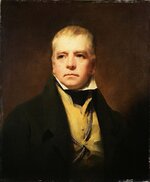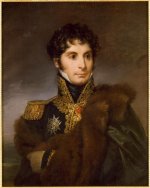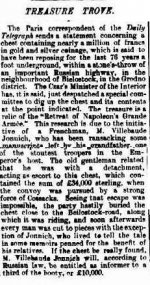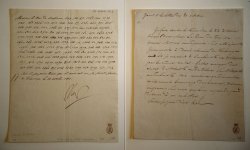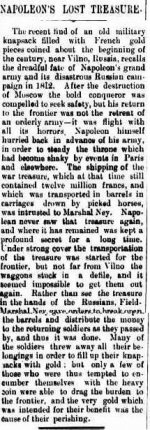Crow
Silver Member
- Jan 28, 2005
- 3,325
- 9,293
- Detector(s) used
- ONES THAT GO BEEP! :-)
- Primary Interest:
- Other
Hello TT
The lost treasure of Napoleon Bonaparte grand army is an interesting one. For me personally it is too much of large area to search too full of complexities however that said for some it may be manageable. this said there still The possibility of finding a soldier cache from that date. By tracing the original route the grand Army took in retreat? The event must of left poor Napoleon Bonaparte devastated to lose such a captured treasure.

The story of Undiscovered gems of French Emperor Napoleon Bonaparte are still haunts the minds of both treasure seekers and adventure lovers worldwide, but especially in France. Almost right after Napoleon’s so-called “Russian Campaign” in 1812, as well as half a century later, surviving former officers and ordinary soldiers of the French Grande Armée literally implored the Russian authorities to let them come back to our country in search for the great commander’s hidden treasure.
Many of those enthusiasts were allowed to Russia and even provided with money, people and vehicles but returned to France empty-handed, having found nothing on Russia’s illimitable territories where the two armies clashed and where Napoleon’s teeming treasures were allegedly concealed. Generally speaking, this came as no surprise for anyone, given that the late autumn of 1812 only saw those treasure hunters hastily fleeing the enemy’s push along the devastated Russian roads.
The location of their commander’s trove was naturally the last thing they thought about back in those days. And still, many soldiers and officers were hopeful that Napoleon did hide the looted valuables somewhere in Russia after all. Referring to geographic and archive materials, many will try to renew the subject of the French emperor’s legendary jewels. So, let’s begin our little journey…shall we?
October 19th, 1812, Napoleon’s troops were leaving the nearly burnt to the ground Moscow. Five weeks before that, they had been looting not only the citizens’ private houses but also the Kremlin and Moscow’s numerous churches. Having collected a lot of gold and silver items, candlesticks, icon frames and jewelry, the French even removed the gilded cross from the Russian capital’s famous Ivan the Great Bell Tower. When leaving Moscow, each of Napoleon’s soldiers appeared as nothing but a walking treasure, with at least 10 kilograms of stolen valuables on him.
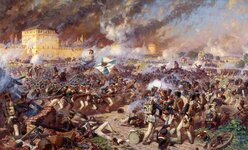
The transportation of the emperor’s loot alone required 200 horse-drawn vehicles. Having decided to retreat, Bonaparte ordered his troops to blow up the Kremlin in revenge for the three unsuccessful offers of peace to Russian Emperor Alexander I. As a result, several Kremlin towers were ruined, as well as some of its walls, the Arsenal’s building, the Assumption Belfry and the Filaret Annex located right next to the Ivan the Great Bell Tower.
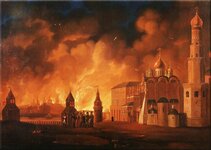
Both in the autumn of 1812 and much later, Napoleon considered the movement of his army towards Smolensk a march rather than retreat. In the early morning hours of October 25th, French reconnaissance attempts were frustrated by a group of Russian Cossacks who attacked Napoleon’s escort.
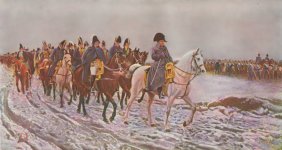
The same morning witnessed a council of war taking place in the French army where Napoleon and his marshals decided to leave Russia via Borovsk and Vereya to Mozhaisk and then Smolensk. In fact, October 25th 1812 became the first day of Napoleon troops’ genuine retreat. Over 14,000 mounted cavalry, nearly 90,000 boot-borne troops and some 12,000 non-combatant and ill soldiers passed through the Kaluga Gate - a total of 116,000 people and 569 hardware items.
Napoleon’s retreat along the Kaluga Road was only hampered by an early winter and frosts that came all of a sudden in late October. The starving and freezing French soldiers were constantly attacked by the Russian army’s forward infantry force and guerillas.
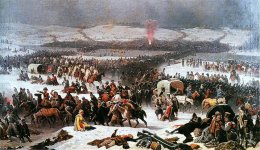
The load of treasures looted from Moscow prevented the French from moving faster and forced them to hide the gold and the gems anywhere around to come back one day to find them. Emperor Bonaparte was compelled to part with his treasure as well. At least, the mentioned 200 horse-drawn vehicles never managed to reach France and were said to have been concealed somewhere in Russia. Since then, there have been a lot of attempts to discover them.
To be continued...
Crow
The lost treasure of Napoleon Bonaparte grand army is an interesting one. For me personally it is too much of large area to search too full of complexities however that said for some it may be manageable. this said there still The possibility of finding a soldier cache from that date. By tracing the original route the grand Army took in retreat? The event must of left poor Napoleon Bonaparte devastated to lose such a captured treasure.

The story of Undiscovered gems of French Emperor Napoleon Bonaparte are still haunts the minds of both treasure seekers and adventure lovers worldwide, but especially in France. Almost right after Napoleon’s so-called “Russian Campaign” in 1812, as well as half a century later, surviving former officers and ordinary soldiers of the French Grande Armée literally implored the Russian authorities to let them come back to our country in search for the great commander’s hidden treasure.
Many of those enthusiasts were allowed to Russia and even provided with money, people and vehicles but returned to France empty-handed, having found nothing on Russia’s illimitable territories where the two armies clashed and where Napoleon’s teeming treasures were allegedly concealed. Generally speaking, this came as no surprise for anyone, given that the late autumn of 1812 only saw those treasure hunters hastily fleeing the enemy’s push along the devastated Russian roads.
The location of their commander’s trove was naturally the last thing they thought about back in those days. And still, many soldiers and officers were hopeful that Napoleon did hide the looted valuables somewhere in Russia after all. Referring to geographic and archive materials, many will try to renew the subject of the French emperor’s legendary jewels. So, let’s begin our little journey…shall we?
October 19th, 1812, Napoleon’s troops were leaving the nearly burnt to the ground Moscow. Five weeks before that, they had been looting not only the citizens’ private houses but also the Kremlin and Moscow’s numerous churches. Having collected a lot of gold and silver items, candlesticks, icon frames and jewelry, the French even removed the gilded cross from the Russian capital’s famous Ivan the Great Bell Tower. When leaving Moscow, each of Napoleon’s soldiers appeared as nothing but a walking treasure, with at least 10 kilograms of stolen valuables on him.

The transportation of the emperor’s loot alone required 200 horse-drawn vehicles. Having decided to retreat, Bonaparte ordered his troops to blow up the Kremlin in revenge for the three unsuccessful offers of peace to Russian Emperor Alexander I. As a result, several Kremlin towers were ruined, as well as some of its walls, the Arsenal’s building, the Assumption Belfry and the Filaret Annex located right next to the Ivan the Great Bell Tower.

Both in the autumn of 1812 and much later, Napoleon considered the movement of his army towards Smolensk a march rather than retreat. In the early morning hours of October 25th, French reconnaissance attempts were frustrated by a group of Russian Cossacks who attacked Napoleon’s escort.

The same morning witnessed a council of war taking place in the French army where Napoleon and his marshals decided to leave Russia via Borovsk and Vereya to Mozhaisk and then Smolensk. In fact, October 25th 1812 became the first day of Napoleon troops’ genuine retreat. Over 14,000 mounted cavalry, nearly 90,000 boot-borne troops and some 12,000 non-combatant and ill soldiers passed through the Kaluga Gate - a total of 116,000 people and 569 hardware items.
Napoleon’s retreat along the Kaluga Road was only hampered by an early winter and frosts that came all of a sudden in late October. The starving and freezing French soldiers were constantly attacked by the Russian army’s forward infantry force and guerillas.

The load of treasures looted from Moscow prevented the French from moving faster and forced them to hide the gold and the gems anywhere around to come back one day to find them. Emperor Bonaparte was compelled to part with his treasure as well. At least, the mentioned 200 horse-drawn vehicles never managed to reach France and were said to have been concealed somewhere in Russia. Since then, there have been a lot of attempts to discover them.
To be continued...
Crow


